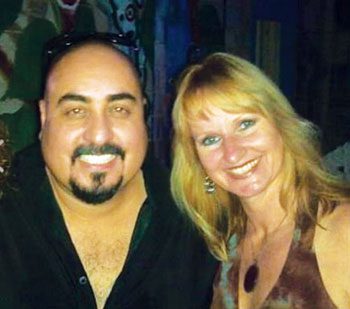
|
| Steven Urenda and Lauren Urenda |

|
| Williams. |
Anthony Williams, a 21-year-old college student from Kansas, participated in fasting for one day this year after receiving inspiration from a Muslim friend.
“I basically saw him while fasting and decided it probably would be good to fast with him for a day,” said Williams. “It was difficult, because it was a typical hot summer day in Kansas and I thought the best thing to do would be to keep myself busy and not think about the time. At the same time, I was looking forward to that cup of water during sunset.”
Because the days are long and hot across the northern hemisphere, it is often difficult for those who are fasting to go about their daily routine without food and water.
However, the purpose behind Ramadan is more than restrictions on food and water during the day. Ramadan is a whole month of dedication. Ramadan for Muslims is for the righteousness of God and for those who are fasting to restrict themselves from bad habits as well. Lying, cursing, sexual activity and anger are examples of actions that must be absent while fasting during the daytime.
Fasting can be easier for large Muslim communities, as individuals have the support of family and friends who are in the same metaphorical boat.
Mary Renee, a wife and mother of four children, who is also from Kansas, decided to try fasting to experience Ramadan. She completed one day of fasting before considering extending her fast for one more day.
“I had a headache by around 5:30 p.m., but the freedom from anger and lying and distracting thoughts was wonderful,” Renee said. “And the appreciation of dinner was awesome. It was so purifying both physically and spiritually.”
It is often more difficult for people who are fasting when they’re in an environment exposed to food or in a situation where different emotions tend to arise.
Jenna Van Leer, a 20-year-old from California, fasted for one day while on her shift as an EMT and was constantly tempted throughout the long shift.
“The hardest part of fasting for me was definitely being around all the resources of eating and drinking and having to restrain myself from that,” Van Leer said. “I had to fight temptation while my partner was eating all day.”
After her experience, Leer noted that she realized how much people take for granted.

|
| Van Leer |
“The best part of it was that it felt good— like I had a purpose to do something,” Van Leer said. “It made me think about how much I take for granted. Something as simple as being able to eat during the day when other people around the world basically fast every day— and not by choice.”
Ramadan is a spiritual month during which one strengthens his or her relationship with God, which is what 48 year-old Steven Urenda is attempting to accomplish.
“I’ve been on a spiritual journey in the past one and a half years to become closer to god; and I identify as a Christian,” Urenda said. “I have a great amount of friends who are Muslim in this community.”
Urenda lives in Westland with his wife, Laura. Both are fasting for the entire month of Ramadan. He described his first week as a unique and humbling experience.

|
| Renee |
Urenda and his wife are also attempting to perform all of the five daily prayers that Muslims recite.
“The physical side of it has been tough the first few days, but it’s humbling and rewarding because for this whole month, God has your dedication,” Urenda said. “You’re so used to walking to the fridge very often. It’s great to have a month to not take things for granted and be thankful for what you have.”
Each participant The Arab American News spoke with mentioned that the reminder to be thankful has been the true reward while fasting. They all encourage others to attempt fasting for a day, to better understand a culture and religion they may not be familiar with.
“Me and my wife love, adore, and respect the culture, religion, and community so much,” Urenda said. “Fasting this week so far has been a great experience for a better understanding of it all.”
Williams also shared the same sentiments.
“I think it’s an important aspect,” he said. “I think we need to learn each other’s practices, for all cultures really, to better understand and see the world through each other’s eyes.”






Leave a Reply